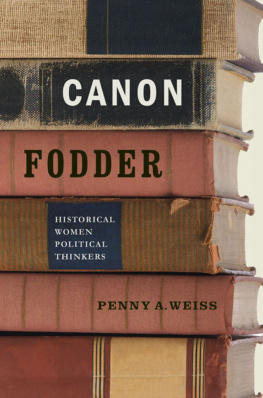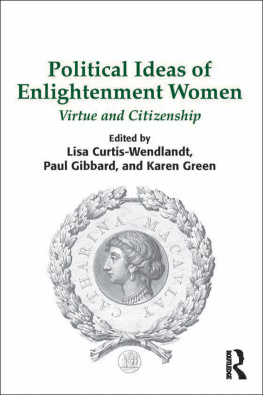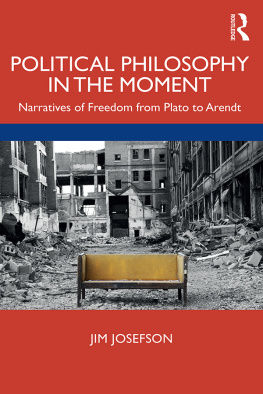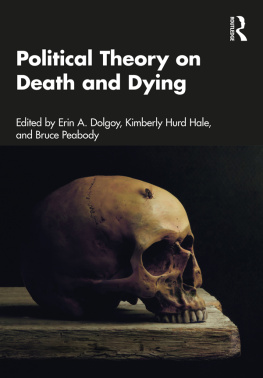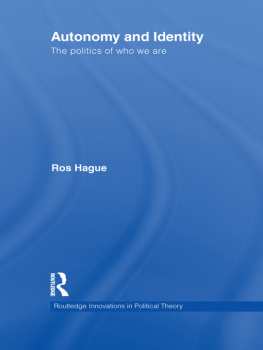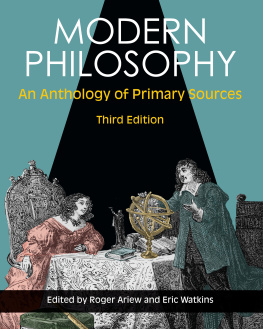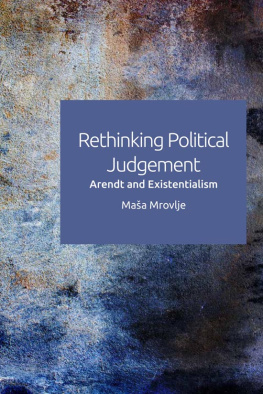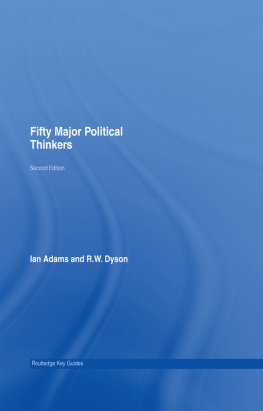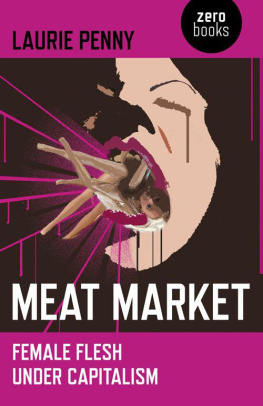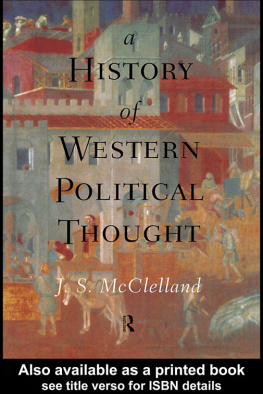Library of Congress
Cataloging-in-Publication Data
Weiss, Penny A.
Canon fodder : historical women political thinkers / Penny A. Weiss.
p. cm.
Includes bibliographical references and index.
Summary: A discussion of women thinkers in political philosophy, and the nature of political inquiryProvided by publisher.
ISBN 978-0-271-03519-2 (cloth : alk. paper)
1. Women political scientists.
2. Women political scientistsHistory.
3. FeminismPolitical aspects.
I. Title. JA92.W45 2009
320.092'2dc22 2009000981
Copyright 2009
The Pennsylvania State University
All rights reserved
Printed in the United States of America
Published by The Pennsylvania State University Press,
University Park, PA 16802-1003
It is the policy of The Pennsylvania State University Press to use acid-free paper. This book is printed on Natures Natural, containing 50% post-consumer waste, and meets the minimum requirements of American National Standard for Information SciencesPermanence of Paper for Printed Library Material, ANSI Z39.481992.
As a senior in college, finally and reluctantly taking the dreaded theory class required of all political science majors, I fell in love with political theory. Unlike the law classes I repeatedly and eagerly enrolled in, theory, I assumed, would be politically irrelevant and mysteriously difficult. Nonetheless, practically from the moment I cracked the covers of Platos Republic and Aristotles Politics I loved the questions that were being asked, the debates about the answers, the styles of writing, and the connections between ideas and practices that testify to theorys importance.
However, even as I was falling in love with theory, I was also wrestling with what was being said about women, trying to overlook it, correct it, or explain it away. I was embarrassed for myself and the authors, unaccepting of what they had to say, and certainly not elevated or enlightened by it. In The Book of the City of Ladies (1405), Christine de Pizan introduces Christine, a character who has great love... for inquiring into the truth of things through long and continuous study (Pizan 1997, 123). Not despite but because of her study, Christine despised [her]self and the entire feminine sex (120). As Pizan knew, any woman accepting philosophys verdicts about women would be filled with self-hatred and disdain for her sex. I cannot understand this hostility, she confessed (120). Lady Reason suggests that Christine stop think[ing] that all the words of the philosophers, despite their status, are articles of faith and that they cannot be wrong (122). Indeed! We should also start reading some different philosophers. Questioning what the canon has to say about women only begins to tap into what constitutes its patriarchal assumptions and approaches.
Even in graduate school, I never read political philosophy written by a woman. Ever since then, however, I have been trying to fix that. As I look back on the syllabus of the first course I taught in the history of feminist theory, in 1988, I see that about half of it was feminist analysis of male thinkers. But I had begun my quest, for also on the syllabus were Emma Goldman, Mary Wollstonecraft, and Simone de Beauvoir. I never would have guessed, as I opened up the Republic, where the journey would take me. From the moment I discovered this other history, this is the book I have wanted to write, or pretty darn close to it, which is so exciting and amazing to me. I feel as though I have been working on it for about twenty years; it has been a lengthy reeducation. I am a little anxious about cutting the cord, continually tempted as I am to tinker and embolden, but I am definitely ready for some new projects, too. Here goes everything, is kind of how letting go of this one feels, as though it is the last child leaving home (what a coincidence).
Discovering historical women political thinkers is what has sustained me in academia, a world that has never really felt like home. Whether because of my working-class background, my politics, or my personality, the university and I have long been a little uncomfortable with one another. I am grateful to Purdue University especially for the opportunity to teach what I want (usually) how I want to teach it (always) and for an office in which to work, with my beloved books all around me. Purdue has also given me some cherished colleagues, as well as a small grant that enabled me to visit Howard University, home of Anna Julia Coopers papers. The first woman to earn tenure in the political science department, I have had my fair share of struggles there, too. As I finish this book I am also closing things up at Purdue, frustrated by low pay and credibility. Choosing not to live with so much resentment, and offered greener pastures, I look eagerly forward to what comes next, as I move on to become the director of womens studies at St. Louis University. Thanks especially, and best wishes, to the women and the theorists in the department.
My largest debt is to my students. For twenty years they have been on this road with me. I learn from their questions, responses, and papers and feed off their intellectual and political energy. Since I wrote this book without major grants or leaves, nearly everything in it emerged from my classroom. I have tried out all the ideas in this book in the classroom first. We read texts no one else was reading, and they wrote about them in ways that sometimes gave me goose bumps, for they took the authors and their essays as seriously as they took any canonical thinker, not always knowing how remarkable that was. Im never sure how serious other academics are when they talk about learning from their students, but I have certainly learned with mine, and this book would not exist without them.
My deepest intellectual debt is to Berenice Carroll and Hilda Smith. They were two of the organizers of a 1991 National Endowment for the Humanities Summer Seminar, Integrating Women into the Undergraduate Curriculum, where I first encountered some of the women I write about here, and both continue to support and inspire me personally and through their work.
In the end, the challenge to political theory presented here is a broad and deep one, touching on who we read, what questions we ask, and how we talk about core issues. It doesnt take balls to question the legitimacy of philosophys canon, or the necessity of a canon at all. In fact, given that men are celebrated by the canon as, variously, more rational, more political, more courageous, more virtuous, and decidedly more influential, they may get in the way. Perhaps it takes ovaries to deliver.
, Power: Mary Astell, appeared in Hypatia: A Journal of Feminist Philosophy (2004) as Including Womens Voices in Political Thought. It went through many revisions to please their always demanding but encouraging editors and readers. I thank these presses for permission to reprint my work.

